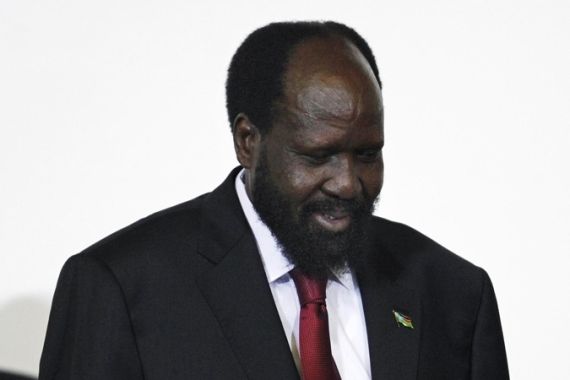Row over Sudan secession remarks
South Sudan President Salva Kiir’s statement suggesting he would vote for independence angers northern politicians.

Salva Kiir, South Sudan’s president, gave his strongest hint yet that he would vote to declare independence from the north in a looming referendum, stoking tensions 100 days ahead of the sensitive plebiscite.
Kiir told thousands of supporters in the southern capital Juba that he would not vote for unity as nothing had been done to make unity attractive, increasing pressure on already deeply troubled relations with northern leaders who are campaigning for the two halves of the country to stay together.
“I have my own assessment, and I can say what I have observed by myself … I can say if I was to vote alone for unity or the secession or independence of southern Sudan, I would not vote for unity because I have not seen what attracted me to unity,” Kiir said on Friday, in a recording of his speech heard by the Reuters news agency.
But a senior official in the north’s dominant National Congress Party (NCP) said it was “totally unacceptable” that Kiir has now clearly come out for separation, and that he is trying to influence southerners.
“He [Kiir] has gone against the CPA [the 2005 Comprehensive Peace Agreement] which said the parties should work together for unity,” Rabie Abdelati said, calling on him to withdraw the comments.
He also repeated earlier threats from NCP ministers that the party might not recognise the referendum if the SPLM tried to force a separation vote.
Joseph Klato, a senior aide to Kiir, said the president did not mean to discuss his own voting intentions, but merely to point out that southerners have so far not been given any compelling reasons to support continued union with the north.
Sensitive issue
People from Sudan’s oil-producing south were promised a vote on whether to secede or stay in Sudan in a 2005 peace deal that ended decades of north-south civil war.
Arrangements for the vote have fallen behind schedule, prompting analysts to warn that there is a risk of a return to conflict if the vote is delayed or disrupted.
Southerners, embittered by the war, are widely expected to vote for independence, but Kiir’s Sudan People’s Liberation Movement (SPLM) has up to now stuck to the official line agreed in the 2005 accord, that they would try to make unity attractive and leave the final decision to the people of the south.
The vote is highly sensitive in the north because most of the country’s oil reserves, responsible for up to 45 per cent of state revenues, lie in the south. Northern and southern leaders have not yet agreed on how they would share oil revenues in the event of a split.
Kiir, speaking after returning from a trip to the United States, said he would not accept any delay to the scheduled start of the referendum.
“Our partners in the north showed very little interest or activity to make unity a realistic proposition. At the moment, all signs point to the fact that on January 9th, 2011, southern Sudanese people will vote overwhelmingly for independence,” read an English transcript of Kiir’s speech seen by Reuters.
Kiir said he was determined to avoid a return to violence but added “the vehicle we are driving has no reverse gear and when we are pushed to the wall, we will be left with no option but to defend ourselves.”